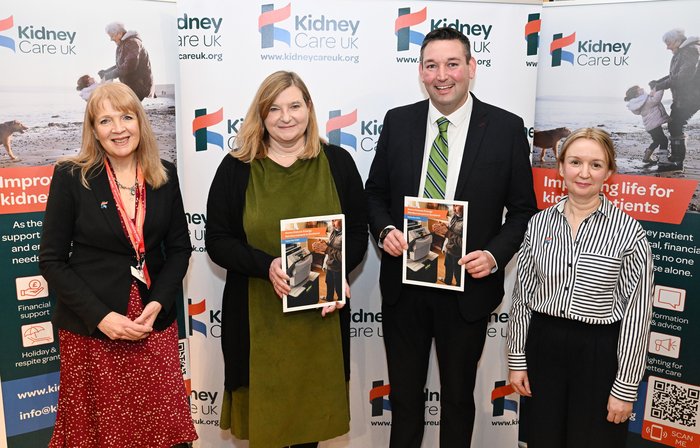The Scottish government have confirmed the introduction of the first-ever national guidelines for reimbursement for people on home dialysis in Scotland following campaigning from Kidney Care UK.
The announcement was made by Jenni Minto MSP, Minister for Public Health and Women's Health, at a roundtable discussion on the impact the cost of living crisis is having on people with kidney disease in Scotland, led by Kidney Care UK and hosted by Miles Briggs MSP.
I am pleased to speak at this event tackling the impact of the cost of living crisis on people with kidney disease in Scotland. We have agreed a national policy to reimburse patients for the additional electricity costs of home dialysis so that patients are not exposed to the impact of high energy prices.Jenni Minto MSP, Minister for Public Health and Women's Health
The guidance has been sent to health board chief executives and will be reviewed in six to 12 months to ensure that it is achieving the intended effect of improved energy support for people who choose to dialyse at home.
It covers people of all ages and on all modalities of dialysis and should not depend on income.
The guidance also asks boards to consider including reimbursement towards the heating of the room and requires them to let people on dialysis know that there is reimbursement available to them.
Judith Connell, Policy Officer for Scotland at Kidney Care UK, said: “We welcome the introduction of these new guidelines. They will make a considerable difference to more than 200 people in Scotland who are on home dialysis and open up more choice to others who would opt to be at home for their life-saving treatment. We look forward to seeing these guidelines rolled out as soon as possible and urge all health boards to ensure that their staff are telling their dialysis patients about them.”

Campaigning for home dialysis reimbursement in Scotland
Kidney Care UK's November 2023 Home Dialysis Energy Reimbursement in Scotland report identified that only half (seven) of the health boards had an existing home haemodialysis (HHD) reimbursement policy in place and that the rate at which home dialysis patients were reimbursed varied between health boards. Only four of the 14 health boards (29%) in Scotland had a reimbursement policy in place for automated peritoneal dialysis (APD). Having a policy did not necessarily mean that all of a board’s APD patients were receiving the payments they were entitled to.
Fiona Loud, Policy Director at Kidney Care UK, said: “What is clear following today’s discussions is that progress is being made but there is still so much more that needs to be done. People who need dialysis should be making decisions based on what is the right treatment for them, not based on financial constraints, fears of high energy bills or their ability to pay to travel, especially in rural areas or in and around the Highlands and islands.
“The cost of living crisis is a huge concern for people with kidney disease in Scotland and throughout the UK. We’re pleased that our campaign has made a difference and we stand ready to continue to work with the Scottish government and health boards to ensure that these guidelines benefit everyone and that no one with kidney disease in Scotland is left out of pocket due to their kidney health, whether this is due to home dialysis or travelling to and from in-centre dialysis treatment.”
Scottish in-centre dialysis transport: change and improvements urgently required
At the roundtable discussion Kidney Care UK also released their latest report, which revealed that people who travel to a hospital or unit for their dialysis treatment face an unreliable, inefficient transport service, long travel and waiting times to and from in-centre dialysis and a lack of suitable vehicles and drivers.
The vast majority of patients who responded to the charity’s survey who take a private car to and/or from in-centre dialysis are not reimbursed at all for their travel costs and are left to foot the bill themselves.